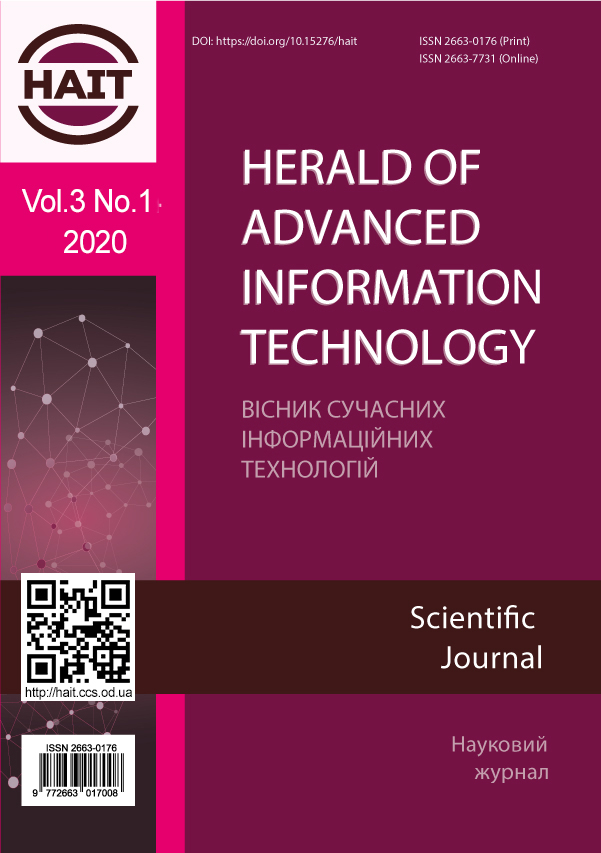Heuristic models and methods for application of the kohonen neural network in the intellectual system of medical-sociological monitoring
Main Article Content
Abstract
For increasing the speed of making classification decisions, the possibilities of supervised deep neural networks
training are used in systems of medical and sociological monitoring. But the data obtained during the monitoring process are semi-
structured and -labelled. This greatly reduces speed and increases supervised machine-training error. The paper proposes heuristic
models and methods of using the Kohonen network to increase the training rate on the semi-supervised mode without losing the
accuracy level of data classification in intelligent systems of medical and sociological monitoring. More specifically, proposed tools
include improved models for the presentation of semi-structured and -labelled medical and sociological monitoring data in the
spaces of properties and features due to formalization of procedure of the detailed data aggregation, as well as the semi-supervised
training of the Kohonen network using the method of matching existing pre-labelled data with the obtained labels of features
clusters. In addition, the method of adjusting weight coefficients in the process of training the Kohonen neural network through the
use of a modified genetic algorithm to classify medical and sociological monitoring data was further developed. The proposed
modification of the genetic algorithm consists in using the method of matching labels of classes and clusters in assessment the
adaptability of chromosomes in the population generated for each example from training sample of medical and sociological
monitoring data. It is proposed for evaluating the adaptability of chromosomes to calculate the completeness of the classification as
the ratio of the number of found representatives of the positive class to all representatives of the positive class. When performing
the selection procedure on the basis of the obtained adaptability score, the two most adapted (“winner” and “vice-winner”)
chromosomes are selected and crossed, whereas in contrast, the two least adapted (“loser” and “vice-loser”) chromosomes are
deleted. The crossing is implemented as the exchange of genes between the winner and vice-winner chromosomes, taking into
account a randomly selected crossing-over point. Upon mutation, a random number distributed according to a uniform law is added
to each chromosome gene, which is an auxiliary method for creating a new chromosome to prevent degeneration of the population.
The proposed heuristic models and methods are the basis for the implementation of a separate module as part of the intellectual
system of medical and sociological monitoring. Testing the modified intellectual system using well-known test examples from the
machine training database and real medical and sociological data showed an increase in the training speed of the Kohonen network
with a given level of classification accuracy. Thus, the introduction of the proposed tools allows increasing the efficiency of
classification decisions without losing their level of accuracy in intelligent systems of medical and sociological monitoring.
training are used in systems of medical and sociological monitoring. But the data obtained during the monitoring process are semi-
structured and -labelled. This greatly reduces speed and increases supervised machine-training error. The paper proposes heuristic
models and methods of using the Kohonen network to increase the training rate on the semi-supervised mode without losing the
accuracy level of data classification in intelligent systems of medical and sociological monitoring. More specifically, proposed tools
include improved models for the presentation of semi-structured and -labelled medical and sociological monitoring data in the
spaces of properties and features due to formalization of procedure of the detailed data aggregation, as well as the semi-supervised
training of the Kohonen network using the method of matching existing pre-labelled data with the obtained labels of features
clusters. In addition, the method of adjusting weight coefficients in the process of training the Kohonen neural network through the
use of a modified genetic algorithm to classify medical and sociological monitoring data was further developed. The proposed
modification of the genetic algorithm consists in using the method of matching labels of classes and clusters in assessment the
adaptability of chromosomes in the population generated for each example from training sample of medical and sociological
monitoring data. It is proposed for evaluating the adaptability of chromosomes to calculate the completeness of the classification as
the ratio of the number of found representatives of the positive class to all representatives of the positive class. When performing
the selection procedure on the basis of the obtained adaptability score, the two most adapted (“winner” and “vice-winner”)
chromosomes are selected and crossed, whereas in contrast, the two least adapted (“loser” and “vice-loser”) chromosomes are
deleted. The crossing is implemented as the exchange of genes between the winner and vice-winner chromosomes, taking into
account a randomly selected crossing-over point. Upon mutation, a random number distributed according to a uniform law is added
to each chromosome gene, which is an auxiliary method for creating a new chromosome to prevent degeneration of the population.
The proposed heuristic models and methods are the basis for the implementation of a separate module as part of the intellectual
system of medical and sociological monitoring. Testing the modified intellectual system using well-known test examples from the
machine training database and real medical and sociological data showed an increase in the training speed of the Kohonen network
with a given level of classification accuracy. Thus, the introduction of the proposed tools allows increasing the efficiency of
classification decisions without losing their level of accuracy in intelligent systems of medical and sociological monitoring.
Downloads
Download data is not yet available.
Article Details
Topics
Section
Information technologies and computer systems



